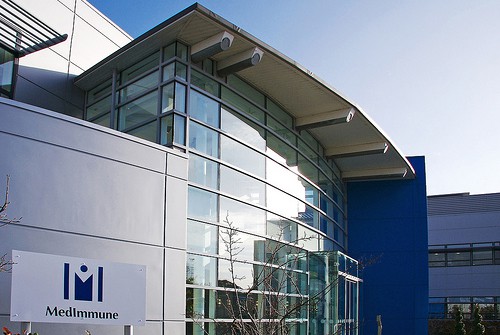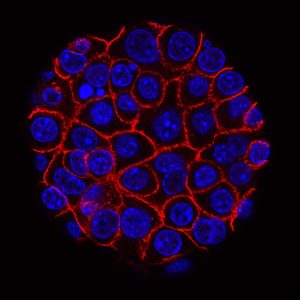
MedImmune to work with biotech Advaxis on cancer
pharmafile | July 22, 2014 | News story | Research and Development, Sales and Marketing | Advaxis, AstraZeneca, Cancer, MEDI4736, MedImmune, oncology, pd1
AZ’s MedImmune has entered into a clinical trial collaboration with US biotech firm Advaxis to help develop new cancer immunotherapies.
The early-stage immunotherapy study will look at the safety and efficacy of MedImmune’s investigational anti-PD-L1 immune checkpoint inhibitor MEDI4736, in combination with Advaxis’ lead cancer immunotherapy vaccine ADXS-HPV.
The trial will assess how well the combo will work for patients with advanced, recurrent or refractory human papillomavirus (HPV)-associated cervical cancer and HPV-associated head and neck cancer.
Both MEDI4736 and ADXS-HPV are cancer immunotherapies, a new class of treatments that use the body’s own immune system to help fight cancer.
MEDI4736 is designed to counter the tumour’s immune-evading tactics by blocking a signal that helps tumours avoid detection, whilst ADXS-HPV enhances the ability of immune cells to combat the tumour.
AstraZeneca says in a statement that pre-clinical evidence suggests the combination of ADXS-HPV with a checkpoint inhibitor, such as MEDI4736, can enhance overall anti-tumour response.
“Our collaboration with Advaxis is further evidence of MedImmune’s commitment to explore novel combination approaches as we progress our immuno-oncology portfolio,” explains Dr Bahija Jallal, executive VP of MedImmune.
“We believe there could be an important clinical benefit from the combination of MEDI4736 with Advaxis’ antigen-specific cancer vaccine.”
The study will be funded and conducted by Advaxis and its results will be used to determine whether more money will be given up for further clinical development.
Under the terms of the deal, MedImmune has a non-exclusive relationship with respect to HPV-driven tumour types. The firm has first right of negotiation for future development of combinations involving MEDI4736 and ADXS-HPV.
“We are excited to be partnering with MedImmune and evaluating MEDI4736 in combination with our immunotherapy,” says Daniel O’Connor, chief executive of Advaxis.
“This is the first time a PD-L1 checkpoint inhibitor will be used with a new class of immunotherapies. As multiple companies vie for a competitive advantage in the future PD-L1 market, the ability of our immunotherapy platform to attack multiple tumour targets makes it an attractive combination therapy.”
AstraZeneca and MedImmune have recently started other immuno-oncology combination trials, including a collaboration with biopharma company Incyte to study MEDI4736 with Incyte’s oral indoleamine dioxygenase-1 (IDO1) inhibitor, INCB24360.
These types of collaborations have become more important to AZ after it was hit by a slew of late-stage failures over the past three years.
It is also keen to shore up its defence against another Pfizer bid, which could come in August, and prove it has the ability to chart its own course without the need to be merged with its US rival.
PD-1 market
The advent of PD-1 drugs (programmed death-1) began this year and is expected to be a market worth over $35 billion a year.
These drugs work by blocking the interaction of PD-1 with its ligands PD-L1 and PD-L2, giving the body’s immune system more chance of recognising cancerous cells and killing them.
The first PD-1 drug was approved in Japan earlier this month for Ono Pharmaceutical/Bristol-Myers Squibb’s Opdivo (nivolumab), an anti-PD-1 monoclonal antibody for use in adults with unresectable melanoma.
Meanwhile, Merck’s pembrolizumab took a big step towards becoming Europe’s first PD-1 cancer treatment as the European Medicines Agency accepted the medicine for review in July.
The EMA is looking at pembrolizumab (MK-3475) for the treatment of advanced melanoma, the deadliest form of skin cancer, after it was found to have a one-year overall survival rate of 69 per cent.
Ben Adams
Related Content

Geneos Therapeutics shares data from phase 1/2 trial for cancer vaccine
Geneos Therapeutics has announced that it has published positive safety, immunogenicity and efficacy data from …

AstraZeneca shares results for Imfinzi in phase 3 trial for small cell lung cancer
AstraZeneca has announced positive high-level results from the phase 3 ADRIATIC trial, which demonstrated that …

FDA accepts BLA for AstraZeneca and Daiichi Sankyo’s datopotamab deruxtecan for breast cancer treatment
AstraZeneca and Daiichi Sankyo have announced that their Biologics License Application (BLA) for datopotamab deruxtecan …








